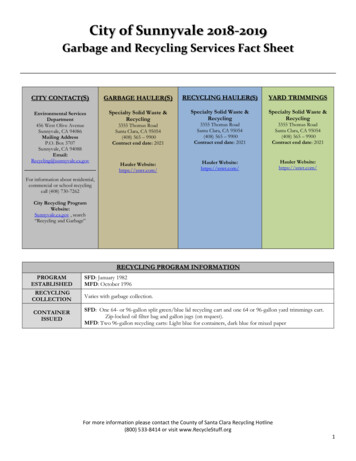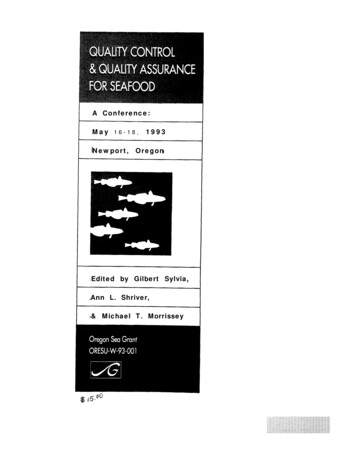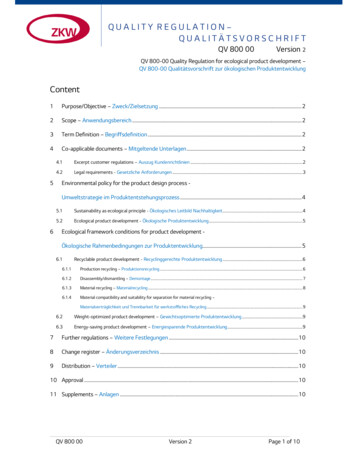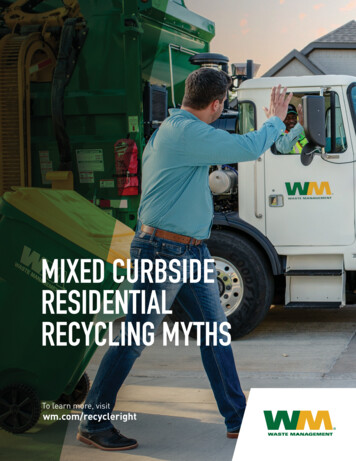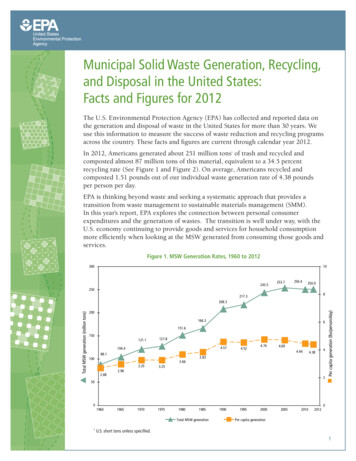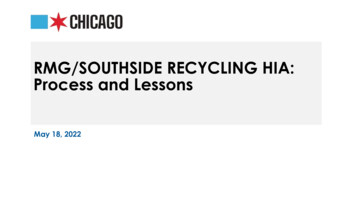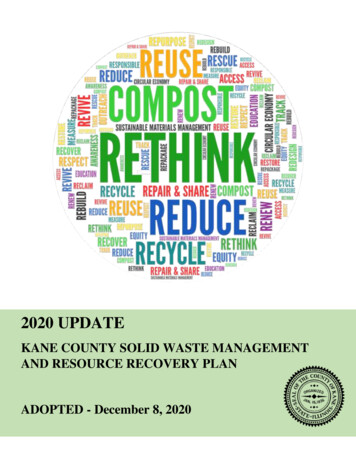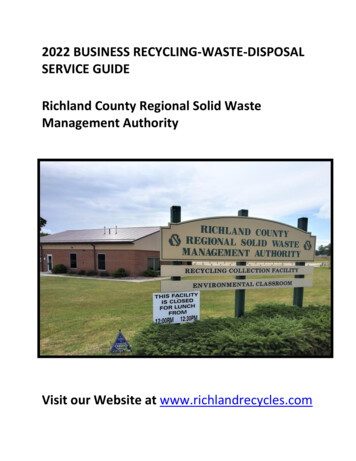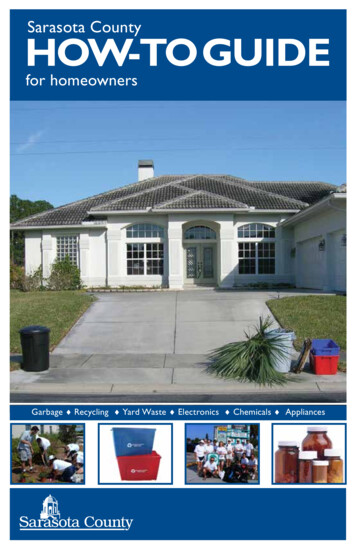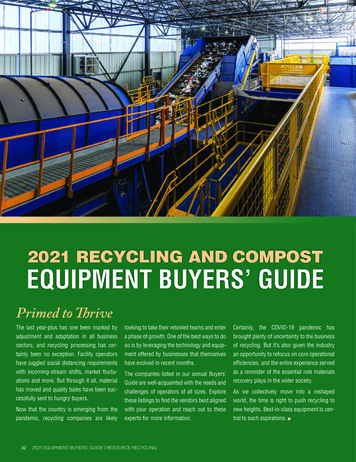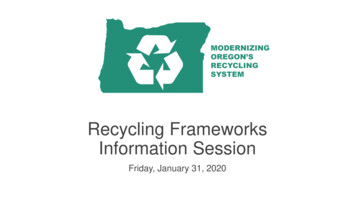
Transcription
Recycling FrameworksInformation SessionFriday, January 31, 2020Recycling Steering CommitteeModernizing Oregon’s recycling system with support from Oregon Consensus
WelcomeRobin Harkless, Oregon ConsensusRecycling Steering CommitteeModernizing Oregon’s recycling system with support from Oregon Consensus2
Recycling Steering Committee membersTimm SchimkeAssociation of Oregon Counties (DeschutesCounty)Amy RothAssociation of Oregon RecyclersNicole JanssenAssociation of Plastics Recyclers/Denton PlasticsBruce WalkerCity of PortlandJeff MurrayEFI RecyclingVinod SinghFar West RecyclingScott KellerLeague of Oregon Cities (City of Beaverton)Recycling Steering CommitteeModernizing Oregon’s recycling system with support from Oregon ConsensusSarah GrimmLane CountyPam PeckMetroJay SimmonsNORPACDavid Allaway & Abby BoudourisOregon DEQ (co-chairs)Kristan MitchellOregon Refuse & Recycling AssociationDylan de ThomasThe Recycling PartnershipLaura LeebrickRogue Disposal & RecyclingJason HudsonWaste ConnectionsMatt SternWaste Management3
Overview of Recycling IssuesDavid Allaway, Oregon DEQRecycling Steering CommitteeModernizing Oregon’s recycling system with support from Oregon Consensus4
Background Overview of recycling Challenges Goal and work of Oregon’s Recycling Steering Committee Scope: “traditional” recyclables (paper, glass, metal,plastic) collected from households and businessesRecycling Steering CommitteeModernizing Oregon’s recycling system with support from Oregon Consensus5
Benefits of recycling Provides local economic/socialbenefits Conserves resources Equivalent to 3% reduction of statewideenergy use Reduces pollution Equivalent to tailpipe greenhouse gasesfrom 750,000 average passenger carsRecycling Steering CommitteeModernizing Oregon’s recycling system with support from Oregon Consensus6
What is recycling?WASTEGENERATORSCOLLECTIONEND USERSPROCESSINGRecycling Steering CommitteeModernizing Oregon’s recycling system with support from Oregon Consensus7
2050 Vision and Framework for Action2050 Visionfor Materials Management in OregonOregonians in 2050 produce and use materials responsiblyconserving resources protecting the environment living wellRecycling Steering CommitteeModernizing Oregon’s recycling system with support from Oregon Consensus8
Oregon’s policy framework Strong focus on recyclingcollection Opportunity model, withprimary responsibilityassigned to localgovernments But only when the cost torecycle is less than the costof disposalRecycling Steering CommitteeModernizing Oregon’s recycling system with support from Oregon Consensus9
Collection 1983 – 1997: Intensivematerial separationRecycling Steering CommitteeModernizing Oregon’s recycling system with support from Oregon Consensus10
Collection 1983 – 1997: Intensivematerial separationRecycling Steering CommitteeModernizing Oregon’s recycling system with support from Oregon Consensus 1997: Shift to “commingling”11
Contamination makes the recycling system more expensiveRecycling Steering CommitteeModernizing Oregon’s recycling system with support from Oregon Consensus12
Contamination reduces recycling by domestic industriesRecycling Steering CommitteeModernizing Oregon’s recycling system with support from Oregon Consensus13
Contamination, if exported, directly harms the environmentPhotos: Megan PonderRecycling Steering CommitteeModernizing Oregon’s recycling system with support from Oregon Consensus14
End markets are inconsistentRecycling Steering CommitteeModernizing Oregon’s recycling system with support from Oregon Consensus15
Producers have limited responsibilityRecycling Steering CommitteeModernizing Oregon’s recycling system with support from Oregon Consensus16
Recycling is part of a larger system2050 Visionfor Materials Management in OregonOregonians in 2050 produce and use materials responsiblyconserving resources protecting the environment living wellRecycling Steering CommitteeModernizing Oregon’s recycling system with support from Oregon Consensus17
Exports . . . and “National Sword” (2017)Recycling Steering CommitteeModernizing Oregon’s recycling system with support from Oregon Consensus18
Oregon response to “National Sword” Cities, counties and collectors: Dropped materialsIncreased rates to pay for additional processingStepped up efforts to reduce contamination at the source Processors and Metro: Invested in technology improvements DEQ: Convened the Recycling Steering CommitteeRecycling Steering CommitteeModernizing Oregon’s recycling system with support from Oregon Consensus19
Recycling Steering Committee charterExamine and make recommendations for modernizing recyclingsystem in Oregon, in order to:Optimize the environmental benefits of managing materialsusing a lifecycle perspectiveCreate a recovery system that is strong and resilient to changesRestore and maintain public trust in the system througheducation and engagementRecycling Steering CommitteeModernizing Oregon’s recycling system with support from Oregon Consensus20
Two major tracks of inquiryLegal and RelationalFrameworksRecycling Steering CommitteeModernizing Oregon’s recycling system with support from Oregon ConsensusInfrastructure21
Legal and relational frameworksIdentified desiredfunctions of a futuresystemSpring 2019Hired a contractor forframework evaluationSummer 2019Confirmed &evaluated 10frameworks forinitial reviewFall 2019Evaluate 5“hybrid” scenariosin more detailJanuary 2020Consensus seekingRecycling Steering CommitteeModernizing Oregon’s recycling system with support from Oregon ConsensusMarch 22
Recycling Steering CommitteeLegal and RelationalFrameworksInfrastructureWhole-System RecommendationsImplementation PlanningRecycling Steering CommitteeModernizing Oregon’s recycling system with support from Oregon Consensus23
Summary Oregon’s recycling policy was created for very differentcircumstances National Sword has revealed limitations in Oregon’s system Recycling continues today . . . . . . but at a reduced scale and with higher uncertainty We have a generational opportunity to modernize our systemRecycling Steering CommitteeModernizing Oregon’s recycling system with support from Oregon Consensus24
Packet of background materials Worksheet Infographic Key ConceptsLink to other materials, including the evaluation of fivescenarios: https://go.usa.gov/xmYYeRecycling Steering CommitteeModernizing Oregon’s recycling system with support from Oregon Consensus25
Framework Scenario ReviewResa Dimino, Resource Recycling SystemsRecycling Steering CommitteeModernizing Oregon’s recycling system with support from Oregon Consensus26
Wrap Up and Next StepsRecycling Steering CommitteeModernizing Oregon’s recycling system with support from Oregon Consensus27
Opportunities for feedback Fill out a worksheet (for those in the room today) Talk with individual Recycling Steering Committee members Local governments: Attend a DEQ/AOC/LOC listening session Speak during a public comment period at an RSC meeting Sign up for email notifications: https://go.usa.gov/xmYYe Provide written feedback to the Recycling Steering Committee:david.allaway@state.or.us Complete DEQ’s feedback surveyRecycling Steering CommitteeModernizing Oregon’s recycling system with support from Oregon Consensus28
DEQ Survey DEQ survey closesFebruary 21 Email Tom Lang toreceive a survey link:tom.lang@state.or.usRecycling Steering CommitteeModernizing Oregon’s recycling system with support from Oregon Consensus29
Thank you!Recycling Steering CommitteeModernizing Oregon’s recycling system with support from Oregon Consensus30
OREGON RECYCLING SYSTEM FRAMEWORKSRESEARCH: SCENARIO EVALUATIONJan 31, 2020
WHAT WE DOSINCE 1986, RRS has expanded its services throughout the value chain: Planning/Implementing recycling and composting programs. Planning/Implementing materials management and zero wastesolutions.Evaluating anaerobic digestion and biomassfacilities. Food waste prevention and organics recoveryplanning. Waste and compliance training. Developing/Facilitating collaborations to increase commodityrecovery. Reviewing/Negotiating hauler and MRF contracts. Designing/Permitting MRF and composting sites.Analyzing the recyclability and compostability of packaging. Developing/Implementing multi-stakeholdercommunications and outreach. RECYCLE.COM RRS 2019
AGENDA Process and Overview Evaluation of Government ManagedScenarios Evaluation of Producer ManagedScenarios
SCENARIO DEVELOPMENT ANDEVALUATION PROCESS4
THE RECYCLING STEERING COMMITTEE PROCESS TO DATER R S E N G AG E DDesiredFunctions of aFuture RecyclingSystemGap Analysis:currentframeworkagainst desiredfunctionsEvaluation of 10alternativeframeworksagainst functionsand criteriaDevelopment of5 frameworkscenariosEvaluation andreport out(TODAY!) of 5frameworkscenarios5
WHAT IS ARECYCLINGFRAMEWORK?Collection of elementsdesigned to meetcertain functions LawsPoliciesProgramsAgreementsEND ORLOCALGOVERNMENTSTATEGOVERNMENT*MRF stands for Material Recovery Facility. Itis where the commingled curbside material issorted and prepped for market6
WHAT IS ASCENARIO?Hypotheticalcombination ofelementsdesigned tobetter meetcertainfunctionsEND ORLOCALGOVERNMENTSTATEGOVERNMENT7
WHAT ARE THE FUNCTIONS?AOptimization: Optimizes the benefits of recycling consideringlife-cycle impacts and costsIEducation: Educates and encourages residents and businesses touse the system properlyBResiliency: Resiliently adapts to changes in material supply andend-market demandJUnderstanding Impacts: Engages the public to understand thebenefits and the costs of recycling, preventing waste and reducingimpacts of materials throughout their life-cyclesCFinancing: Provides sustainable and equitable financing forstable operations and capital investmentsKMaterial Selection: Identifies beneficial materials acceptable forcollection programsDIntegration: Integrates system components to achieve overallsystem goalsLCollection: Collects clean, acceptable materials for processingEUpstream: Includes mechanisms to reduce upstream impacts ofmaterialsMIncoming Processing: Ensures processing facilities receive cleanmaterials and in sufficient volumesFEquity: Designs for equity – examining the burdens and benefitsacross the stateNOutgoing Processing: Produces quality materials that reach endmarketsGShared Responsibility: Shares responsibility for the systemamong players including residents and businesses, producers,state and local governments, and recycling industryODownstream: Ensures materials are managed responsibly fromcollection through end marketsHGoals: Uses goals and metrics to measure progress and supportongoing improvementPAccountability: Ensures all players in the system performresponsibly
SCENARIO BUILDING PROCESSFRAMEWORKSELEMENTSSCENARIOFUNCTION / CRITERIA9
GOVERNMENT MANAGEDEnhanced governmentmanagementEXTENDED PRODUCER RESPONSIBILITY (EPR)Post collection EPRExisting OregonFrameworkFull EPRState governmentmanagement withMRF contractsEPR with localcontrol10
ELEMENTS RECOMMENDED FOR ALL SCENARIOS* Parallel access to recycling Mandatory variable rate pricing MRF certification and reporting Life-cycle assessment (LCA)database to inform decision making Statewide list of recyclables Recyclables disposal ban Recycled content requirements and/orincentives Labeling standards Market development activities Enforceable performance and equitystandards Expanded bottle bill (i.e. wine and spirits) Litter and waste prevention / upstreamactivities*How these are applied and by whom will change among frameworks11
SCENARIO EVALUATIONSFUNCTION / CRITERIA
HOW DO THE SCENARIOS DIFFER? FINANCEOPERATIONSGOVERNANCE13
HOW DO THE SCENARIOS DIFFER? Finance Operations GovernanceStateLocalProducerFinanceSCENARIO 3FinanceOperationsSCENARIO 2SCENARIO 1GovernanceOperationsGovernanceFinanceSCENARIO ENARIO 5FinanceOperationsGovernance14
END MARKETROLES AND RESPONSIBILITIES WITHIN ALL FIVE S COLLECTIONSETSMATERIALS ATEPAYER*LOCALGOVERNMENTState governmentmanaged(MRF ENTProducerresponsibilitywith local controlFull producerresponsibility withoptional UCER*DEQ regulatory oversight included in all elements except those noted with an asterisk.LOCALGOVERNMENTLOCALGOVPROVIDES RODUCERENDMARKET*PRODUCERPRODUCERPRODUCER
SCENARIO GROUP 1: ENHANCEDGOVERNMENT-MANAGED MODELS16
GOVERNMENTMANAGEDSCENARIOS:END MARKETPRODUCER/PROMRFKEY line OregonFrameworkLOCALGOVERNMENTFINANCINGOPERATIONAL /CONTRACTUALSTATEGOVERNMENTSTRATEGIC/ REGULATORYAUTHORITY17
GOVERNMENTMANAGEDSCENARIOS:END MARKETPRODUCER/PROMRFKEY DISTINCTIONSCONSUMER/GENERATORPRIVATECOLLECTOR1 - Enhancedgovernment managed Additional RequiredElements Additional FundingNeededLOCALGOVERNMENTFINANCINGOPERATIONAL STRATEGIC/ REGULATORYAUTHORITY18
GOVERNMENTMANAGEDSCENARIOS:END MARKETPRODUCER/PROMRFKEY DISTINCTIONSCONSUMER/GENERATORPRIVATECOLLECTOR2 - State GovernmentManaged (MRFContracts) Everything fromScenario 1 plus MRFcontractingLOCALGOVERNMENTFINANCINGOPERATIONAL STRATEGIC/ REGULATORYAUTHORITY19
SCENARIO 1Enhanced GovernmentManaged System
SCENARIO 1: Enhanced Government Managed SystemState has more authorityNew financing neededMRFs to be permitted orcertified by stateRoles and relationshipsstay the same21
Finance: Local ratepayersOperations: Locally managedcollection; open market eGovernance: DEQ rules andregulations; local franchise / licenseservice agreementsProducer22
ROLES AND RESPONSIBILITIES: Enhanced GovernmentManagedLOCAL GOVERNMENTSTATE GOVERNMENT Regulate and oversee thesystem, including MRFsLCA researchCreate new recyclingadvisory committeeSet statewide mandatorylist of recyclablesRequire parallel recyclingaccess and variable ratepricing Plan and implementrecycling programsthat meet new staterequirementsUpdatefranchise/licenseagreements tocomply with newpoliciesCOLLECTOR Collect material inaccordance withnew requirements Deliver to permittedor certified MRF(s)MRF Implement newoperating andequity standards,reportingrequirements andcontaminationtargetsPRODUCER / PRO No specifiedrole23
BENEFITS Maintains strength of existingsystem – collection opportunitiesEnhance system optimization,integration and accountabilityFormally address post-collectionsegments of the systemCHALLENGES Not all system players haveresponsibility No platform to address upstreamenvironmental impacts and design Limited impact on downstream decisionmaking Need for additional funding24
SCENARIO 2Enhanced State GovernmentManaged System (MRFContracts)
SCENARIO 2: Enhanced State Government Managed System (MRFContracts)State has moreauthority includingMRF contractingSignificant newfinancing neededMRFs to be permitted orcertified by state andcontract with the stateRoles and relationshipsstay the same oncollection side butchange for MRFs26
WHY CONTRACT WITH MRFS? Provide equal access to processing for allparts of the state Greater ability to set environmental healthand safety standards for material endmarkets Mitigate market risk for local programsand ratepayers27
Finance: Local ratepayers fundcollection; State fundsprocessing*Operations: Locally managedcollection; state managedpost-collectionFinanceStateOperations GovernanceLocalGovernance: DEQ rules andregulations; local franchise / licenseservice agreementsProducer28
ROLES AND RESPONSIBILITIES: Enhanced State ManagedSystem (MRF Contracts)LOCAL GOVERNMENTSTATE GOVERNMENT Contract with MRFs forprocessing of programmaterialsRegulate and overseethe systemLCA researchCreate new recyclingadvisory committeeSet statewidemandatory listRequire parallelrecycling access andvariable rate pricing Plan and implementrecycling programsthat meet new staterequirementsUpdate franchise /license agreements tocomply with newpoliciesCOLLECTOR Collect material inaccordance withnew requirements Deliver tocontracted MRF(s)MRF Compete for statecontracts Implementoperating andequity standards,reportingrequirements andcontaminationtargetsPRODUCER / PRO No specifiedrole29
BENEFITSCHALLENGES More engaged management ofpost-collection Equitable access to processing Mitigate market risk Significant departure from status quo inprocessing / marketing relationships Maintain strengths of existingsystem Administratively complex Enhance system optimization,integration and accountability Substantial funding and authorityrequired Not all system players have responsibility No platform to address upstreamenvironmental impacts and design30
KEY CONSIDERATIONS FOR IMPLEMENTATION OF GOVERNMENTMANAGED SCENARIOSNew legislation and rulesAdditional fundingComplexities of MRF contracting process (Scenario 2)Shifting MRF business model (Scenario 2)Service would appear (mostly) seamless to ratepayers31
QUESTIONSClarifying questions to round out understandingof the government managed scenariosWHAT THIS IS An opportunity to learn A chance to seek clarificationWHAT THIS IS NOT A time to debate A forum to express what you like and don’t like A poll to select a framework
SCENARIO GROUP 2: EXTENDEDPRODUCER RESPONSIBILITY MODELS33
WHAT IS EXTENDED PRODUCERRESPONSIBILITY?Extended producer responsibility is a practiceand a policy approach in which producerstake responsibility for management of theproducts and / or packaging they produce atthe end of their useful life. Responsibility maybe fiscal, physical, or a combination of thetwo.WHO ARE THE PRODUCERS?Brands / Retailers34
EPR IN OREGON35
WHAT ABOUT EPR FOR CURBSIDE MATERIALS?36
DRIVERS FOR PRINTED PAPERAND PACKAGING (PPP) EPR Need for stable funding Market challenges Focus on circular economy Stagnant recycling rates RRS 201737
COMMON FEATURES RECOMMENDED FOR ALL EPR SCENARIOS:Managed by aProducerResponsibilityOrganization (PRO)Guided bya ProgramPlanUses EcoModulatedFees38
WHAT IS A PRO? Represents brands / retailers Manages obligation Authorized in legislation Develops and implementsProgram Plan Sets and collects fees39
WHAT IS A PROGRAM PLAN? Blueprint for meeting goals andobligations Proposed list of recyclables Collection / processing arrangements Education and outreach End market development Waste reduction and litter abatement Must be approved by oversight entity(DEQ)40
WHAT IS ECO MODULATION? Method of differentiating fees paidby brands / retailers Incentivize environmental design Penalize negative attributes Added or subtracted from base fee Based on DEQ LCA research Must be approved by DEQ41
EPR SCENARIOS:KEY DISTINCTIONSENDMARKETMRF3 - Post collectionProducer ECOLLECTOR Producers contract withMRFs to fundprocessing andmarketingLOCALGOVERNMENTFINANCINGOPERATIONAL /CONTRACTUALSTATEGOVERNMENTSTRATEGIC/ REGULATORYAUTHORITY42
EPR SCENARIOS:KEY DISTINCTIONSENDMARKETMRF4 - ProducerResponsibility withLocal TOR Post-collection same asScenario 3 Producers fund localgovernment AL /CONTRACTUALSTATEGOVERNMENTSTRATEGIC/ REGULATORYAUTHORITY43
EPR SCENARIOS:KEY DISTINCTIONSENDMARKETMRF5 - Full ProducerResponsibility withOptional ATECOLLECTORLOCALGOVERNMENT System fully fundedand managed byproducersFINANCINGOPERATIONAL /CONTRACTUALSTATEGOVERNMENTSTRATEGIC/ REGULATORYAUTHORITY44
SCENARIO 3Post-Collection EPR
SCENARIO 3: Post-Collection EPRProducers responsiblefor post-collectionsystemMRFs to bepermitted orcertified by stateand contract withPRO(s)Roles and relationshipsstay the same oncollection sideDEQ a regulator andintegrator46
Finance: Local ratepayers fundcollection; PRO(s) fund postcollectionOperations: Locally managedcollection; PRO(s) managedpost-collectionFinanceStateOperations GovernanceLocalGovernance: DEQ oversight andintegration; local franchise / licenseservice agreements; PRO-MRFcontractsProducer47
ROLES AND RESPONSIBILITIES: POST-COLLECTION EPRSTATE GOVERNMENT Expand authoritymatching Scenario 1(including list)Negotiate, approve,oversee, andenforce producer’sprogram planIntegrate ratepayerfunded collectionwith producerfunded postcollection activitiesLOCAL GOVERNMENT Plan andimplementrecyclingprograms thatmeet new staterequirementsUpdatefranchise/licenseagreements tocomply with newpoliciesCOLLECTOR Collect material inaccordance withnew requirementsDeliver tocontracted MRF(s)MRF Compete for PRO(s)contract(s)Implementoperating andequity standards,reportingrequirements andcontaminationtargetsPRODUCER / PRO Manage andfund postcollectionDevelop andimplementprogram planReport on results48
BENEFITS Engages brands / retailersReliable source of fundingEquitable access to processingAddresses upstream anddownstream impactsMitigates market riskMaintain strengths of existingsystemEnhance system optimization,integration and accountabilityCHALLENGES Changing dynamics incorporating newplayers Significant departure from status quo inprocessing and marketing Coordination between collection andprocessing systems49
SCENARIO 4Producer Responsibility withLocal Control
SCENARIO 4: Producer Responsibility with Local ControlProducers responsiblefor funding andmanaging postcollection system andfunding the collectionsystemMRFs to bepermitted orcertified by stateand contract withPRO(s)Relationship betweenlocal government andcollectors remains thesameDEQ a regulator andarbiter of reimbursementprocess51
Finance: PRO(s) funds collectionand post-collectionOperations: Locally managedcollection; PRO(s) managedpost-collectionFinanceStateOperations GovernanceLocalGovernance: DEQ oversight andintegration; local franchise / licenseservice agreements; PRO-MRFcontractsProducer52
ROLES AND RESPONSIBILITIES: PRODUCER RESPONSIBILITYWITH LOCAL CONTROLSTATE GOVERNMENT Expand authoritymatching Scenario 1(except the list)Negotiate, approve,oversee, andenforce producer’sprogram plan(including approvalof list)Oversee andcoordinatereimbursementprocessLOCAL GOVERNMENT Work with state andPRO(s) to obtainreimbursement forrecycling programcostsPlan and implementrecycling programsthat meet new staterequirementsUpdatefranchise/licenseagreements tocomply with newpoliciesCOLLECTOR Collect materialin accordancewith newrequirementsDeliver tocontractedMRF(s)MRF Compete for PRO(s)contractsImplementoperating andequity standards,reportingrequirements andcontaminationtargetsPRODUCER / PRO Manage and fundpost-collectionReimburse collectionprogramsDevelop andimplement programplanReport on results53
BENEFITS Engages brands and retailersReliable source of fundingEquitable access to processingAddresses upstream anddownstream impactsMitigates market riskMaintain strengths of existingsystemGreater system optimization,integration and accountabilityCHALLENGES Changing dynamics incorporating newplayers Coordination of collection programreimbursements Significant departure from status quo inprocessing and marketing54
SCENARIO 5Full Producer Responsibilitywith Optional LocalInvolvement
SCENARIO 5: Full Producer Responsibility WithOptional Local InvolvementProducers responsiblefor collection and postcollection systemMRFs to bepermitted orcertified by stateand contract withPRO(s)Local governmentengagement optionalDEQ a regulator56
Finance: PRO(s) fund entiresystemOperations: PRO(s) managecollection and post-collection;optional local involvementFinanceStateOperations GovernanceLocalGovernance: DEQ oversight;collection and post-collection PRO(s)contractsProducer57
ROLES AND RESPONSIBILITIES: FULL PRODUCERRESPONSIBILITY WITH OPTIONAL LOCAL INVOLVEMENTSTATE GOVERNMENT Expand authoritymatching Scenario1 (except the list)Negotiate,approve, oversee,and enforceproducer’s programplan (includingapproval of list)LOCAL GOVERNMENTChoose to: COLLECTOR Opt-in to contract ascollector for PRO(s) Elect service byPRO(s) Opt-out of systemand receive nofunding Contract eitherdirectly with PRO(s)or to a localgovernmentMeet collectionprogramrequirementsMRFPRODUCER / PRO Compete for PRO(s)contracts Finance andmanage system Implementoperating andequity standards,reportingrequirements andcontaminationtargets Develop andimplement aprogram plan Report on results58
BENEFITS Engages brands & retailersReliable source of fundingEquitable access to processingMitigates market riskAddresses upstream anddownstream impactsGreatest potential foroptimization, integration andaccountabilityCHALLENGES Greatest change in dynamicsincorporating new players Most significant departure from statusquo Potentially significant shift in localgovernment involvement59
KEY CONSIDERATIONS FOR IMPLEMENTATION OF EPR SCENARIOSNew legislation and rulesShifting business modelsIntegration of collection and post-collection (Scenarios 3 and 4)Collection reimbursement process(Scenario 4)Changing role of local government (Scenario 5)Potential changes in collection service (Scenario 5)60
WANT MORE DETAIL?61
NEXT STEPS:STEERINGCOMMITTEEWILL TAKEIT FROMHERE62
QUESTIONSClarifying questions to round outunderstanding of the EPR scenariosWHAT THIS IS An opportunity to learn A chance to seek clarificationWHAT THIS IS NOT A time to debate A forum to express what you like and don’t like A poll to select a framework
RESA DIMINOBRYCE HESTERMANSENIOR ECYCLE.COM RRSBHESTERMAN@RECYCLE.COM64
Wrap Up and Next Steps 27. . Mandatory variable rate pricing MRF certification and reporting Life-cycle assessment (LCA) . contracting LOCAL GOVERNMENT PRIVATE COLLECTOR . PRODUCER/ PRO . END MARKET. MRF. STATE GOVERNMENT. CONSUMER/ GENERATOR. ADDITIONAL FUNDING SOURCE. FINANCING.
